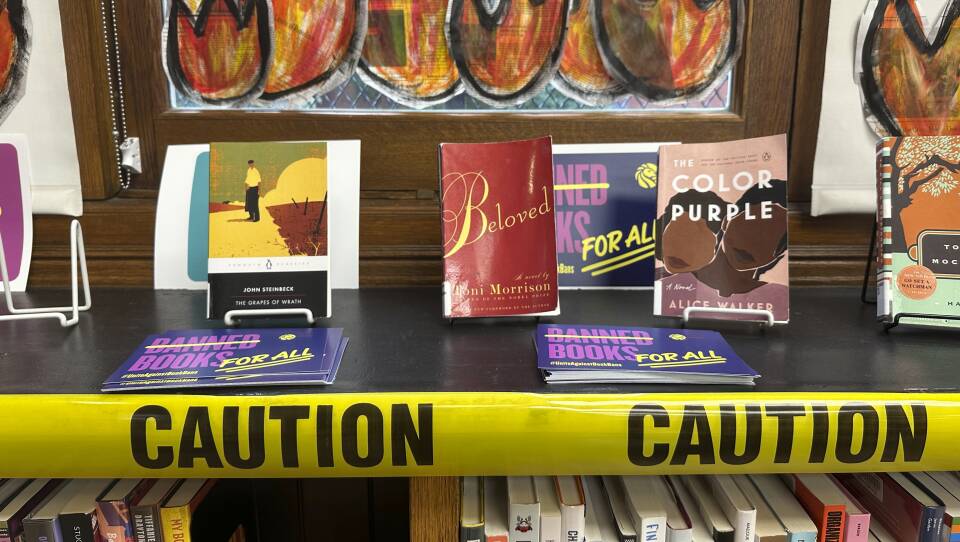Thousands of books are facing scrutiny throughout the country as the book-banning movement continues to gain support, from Florida, to Wisconsin and even New Hampshire. Now, hundreds of authors are using their voices off the page to spread awareness about the effect book bans have on democracy and free speech.
The organization Authors Against Book Bans (AABB), which was formed in 2024, is focused on the freedom to read and composed of authors from all genres who write for readers of all ages. Many of the members have had their work challenged or banned, like AABB board member, Adib Khorram, author of several books including the often-challenged or banned “Darius The Great Is Not Okay.” The book and its sequel, “Darius The Great Deserves Better,” have come under fire for addressing race, sexuality and, according to Khorram, Marxist ideology.
“I think if you talk to any author, especially authors of books for young readers, they will tell you that their books are political – that writing for young people is summoning the future we want for them. And that act is inherently political,” Khorram said. “So most authors consider themselves activists in that way.”
Learning how to do on-the-ground work in support of books and the freedom to read was a new skill he and other authors have been learning through AABB.
“I had been to protests before, but I had never written an op-ed before,” Khorram said. “I had never gone and given a speech to a school board before I started working with Authors Against Books Bans. And that’s a completely different skill set to writing a novel.”
Massachusetts-based author and AABB member Malinda Lo has had her award-winning novel “Last Night at the Telegraph Club” banned from libraries in more than 16 states due to its portrayal of LGBTQ relationships and sexuality. For her, part of the activism is writing commentaries for media outlets in cities where her books are at risk of being banned while also clearing up some serious misconceptions.
“I think there is a big myth that when your book is banned, that will lead to increased book sales. And unfortunately, that is not true,” Lo said. “What book bans lead to is what we call soft censorship or quiet censorship, which is school librarians not purchasing books that they are afraid might be banned. This is bad for the publishers. This is bad for business. It’s certainly bad for authors.”
It can also have a negative effect on the very population the book bans are supposed to help. Children’s book author and illustrator Jeanette Bradley is the author of the banned book “Something Great,” which tells the story of an inventive nonbinary child who uses they/them pronouns. Bradley is the co-leader of the Rhode Island chapter of AABB and she says that while these bans are often framed as protecting children, they end up creating a hierarchy of who to protect.
“Are children of color being protected? Are LGBTQ families being protected? What does it mean when somebody says that they want to protect children, but what they’re doing is removing books based on the identity of a character?” Bradley said. “This isn’t really about books; it’s about people.”
Authors Against Book Bans started in 2024 with 1,500 members, including celebrated authors like Judy Blume, Lev Grossman and Emily St. John Mandel, and has continued to grow, with members in each state and chapters nationwide. The organization and its members continue to create voter guides in support of “freedom to read” advocates, hold press conferences to inform the public about book bans proposed in certain cities and states, and assist lawmakers with “freedom to read” legislation in states like Rhode Island.
“They’re trying to silence us as authors, but that doesn’t stop with us,” Lo said. “If we want to maintain our American democracy, we need to have the ability to speak freely and to create freely.”
This roundtable is the latest installment of Unbound Pages, a yearlong exploration of the anti-book-banning movement in America. Click here to listen to all of the stories in the series.
Guests
- Adib Khorram, author of books for all ages, national leader for Authors Against Book Bans
- Malinda Lo, New York Times bestselling author and member of Authors Against Book Bans
- Jeanette Bradley, children’s book author and illustrator, co-leader of the Rhode Island chapter of Authors Against Book Bans





